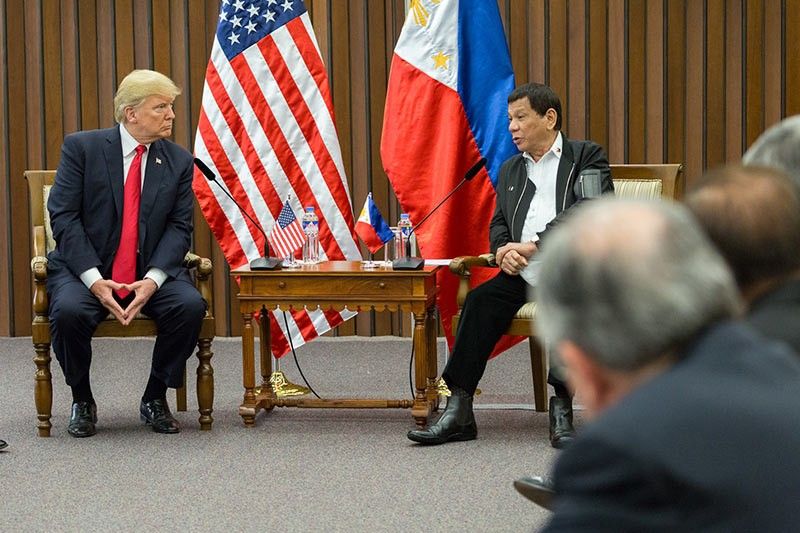Commentary: Trump admin’s management of troubled Philippine-US alliance

A major nuisance between the Philippines and the US regarding their 69-year-old alliance is the ambiguity of the US security guarantee to its Southeast Asian ally as provided by the 1951 Mutual Defense Treaty (MDT) and in the face of China's aggressive expansion in the South China Sea since the second decade of the 21st century.
The 1951 MDT does not provide for any automatic armed response to armed confrontation from both parties since it only requires each signatory to consult each other and determine what armed action if any, both would take.
The treaty's vagueness is further complicated by Washington's policy of maintaining strategic ambiguity about the nature of its treaty commitment. It is silent to any automatic American assistance to its ally in case of an armed conflict between the Philippine and Chinese forces in the South China Sea.
Instead, Washington emphasizes the diplomatic (rather than the military) deterrence of the treaty given that since the US is a treaty ally of the Philippines, China cannot simply assert that events in the South China Sea, including the contested islands, are not any of Washington's business.
Since he became the 16th president of the Philippines in mid-2016, President Rodrigo Duterte made no bones about his doubt on America's willingness to back the Philippines militarily in any confrontation with China over the disputed maritime territory. After he threatened to cancel all joint Philippine-US military exercises in early October 2016, he claimed that "the U.S. will not fight to die for us (the Filipinos)."
Despite Duterte's sharp tirades against the Philippine-US alliance's value, the Trump administration exercised strategic patience and understanding. It also remained focused on the interest of both allies to keep the alliance intact.
In early May 2017, President Donald Trump called Duterte to express Washington's commitment to the MDT and his interest in developing a warm working relationship with him.
Trump proved his worth during the battle for Marawi City from May to October 2017. The troubled alliance got a shot in the arms by the Trump administration's provision of state-of-the-art US drones, assault rifles, ammunition, Gatling guns and rubber boats Philippine Marines.
The Pentagon also deployed reconnaissance aircraft that provided valuable intelligence to the Philippine military that retook the city of Marawi from nearly one thousand militants linked with the Islamic State of Syria and Iraq. By the end of 2018, the two countries' security cooperation activities—joint military exercises, arms transfer, intelligence exchanges and training—have returned to the pre-Duterte administration level.
However, there remained the issue of US security guarantee to the Philippines in the face of Chinese maritime expansion in the South China Sea.
Beyond an iron clad commitment
In a December 2018 press briefing, the Philippine Department of National Defense Secretary Delfin Lorenzana announced the review of the 1951 MDT. He feared that the Philippines might be unnecessarily dragged into an armed confrontation between the US and China.
The DND's effort to reexamine the MDT was motivated by doubts s over what the US can bring to the table and what it expects from the AFP in case of an armed clash between the American and Chinese forces in the South China Sea.
During his March 2019 visit to Manila, Secretary of State Michael Pompeo declared: "As the South China Sea is part of the Pacific; any armed attack on Philippine forces, aircraft or public vessels in the South China Sea will trigger mutual defense obligations under Article 4 of our mutual defense treaty."
His statement constituted a rare but explicit clarification of US treaty obligation as provided by the 1951 MDT. Consequently, Manila decided to set aside its plan for a review of the MDT in view of Secretary Pompeo's verbal commitment that American forces would extend assistance to its ally if any Philippine vessel is attacked in the South China Sea.
Managing a troubled alliance
Trump pursued a transactional approach to America's allies as he pressured them to financially contribute more for their own security. This stoked tensions in America's alliances in Europe and Asia. However, his administration's approach to the Philippine-US alliance is different as it showed strategic patience and understanding to Duterte's sharp rhetoric questioning the alliance's value.
It is too early to know whether or not Joe Biden will follow his predecessor's approach to this troubled alliance. If he raises allegations of human rights violations in the Philippines, this will trigger another crisis in the alliance. Or he might adopt a business as usual approach, and this will ensure the stability of the two countries' security relationship.
Whatever approach Biden will take after Jan. 20,201, he will have to take into account the US China competition, and how the Philippines will figure out in this competition given its role as a linchpin for the US Indo-Pacific strategy as a liberal democracy, and the only treaty ally facing the South China Sea.
Renato de Castro is a trustee and convenor of the National Security and East Asian Affairs Program of think tank Stratbase ADR Institute.
- Latest
























